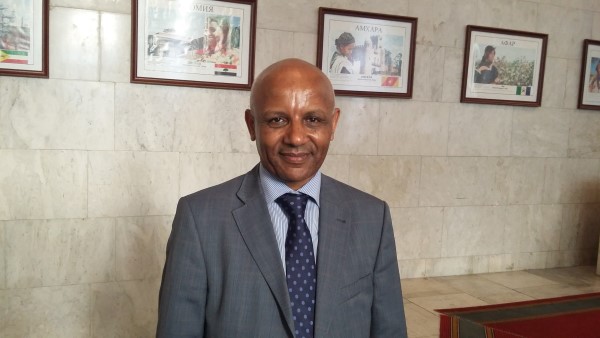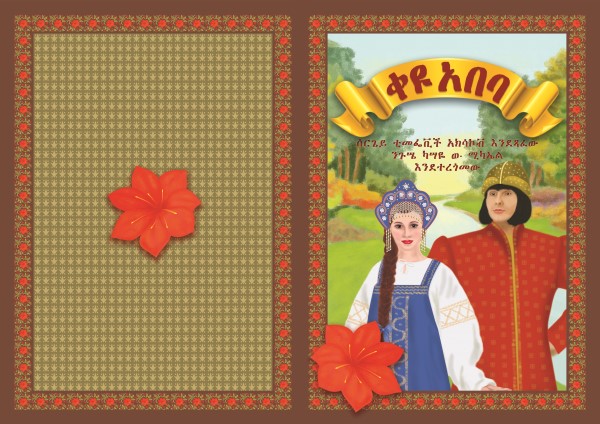
A Masterpiece, Which Opens Russian Heart
/ Главная / Russkiy Mir Foundation / Publications / A Masterpiece, Which Opens Russian HeartA Masterpiece, Which Opens Russian Heart
A presentation of translation of tale “The Scarlet Flower” into the Amharic language, published with the participation of Russkiy Mir Foundation, was held at the festive evening at the Ethiopian Embassy, which was devoted to Alexander Pushkin’s birthday. Embassy’s Secretary General, Chairman of Russia-Ethiopia Friendship Society professor Nygusye Kassae V. Mikael told what connects our countries today to the Russkiy Mir Foundation.

- You have translated a tale “The Scarlet Flower” by a Russian writer Sergey Aksakov into the Amharic language, why precisely it?
- It is because there is humanism, kindness, feelings and sincerity in it. I think, it is a masterpiece, which opens the Russian heart. I suppose it will not just be interesting, but also useful for Ethiopian readers, for children, first of all.
- But it is not the first Russian tale you have translated?
- No, all my translations are connected with warm-heartedness, kindness and humane attitude. My first translation was a tale by Korney Chukovskiy “Doctor Aybolit”.
- “For nothing of the world, don't go to Africa?”
- It is actually a later alternative. And his work is much wider, than these lines, because it is not only about human relations, but also about relation to the nature and animals. It says, we have to save the nature untouched and help everyone – only then we will be able to survive.
- You speak great Russian. Did you study in Russia?
- Yes, thanks to my teachers. I graduated from the History and Philology Department of Patrice Lumumba’s Peoples' Friendship University of Russia in 1991 and then entered the PFUR’s PhD programme.
- Did you always want to study in Russia? Why did you make such a choice?
- Well, I lived near a Russian hospital – of the Russian Red Cross. And the first Europeans I met were Russian doctors. I used to visit them when I was a child, I met them myself. I do even now remember the tasty jam they gave me. I did not just like those people – I trusted them. They were sincere and kids understand everything. Then revolution in Ethiopia started in 1974, there were also other difficulties and I got a study allowance and was to come to study in 1984, but I did not manage to. But I did a year later, in 1985.
- It seems that now your destiny is connected with Russia even more – you are now the leader of Russia-Ethiopia Friendship Society. Is it a rebirth of the Friendship Society, which was working during the Soviet times?
- Yes, this society was working during the Soviet times – I took part in its events, when I was a student. But for evident reasons it did not function for almost 25 years. So, in 2011 we decided to restore it and in 2012 we adopted a charter of the Friendship Society; here, representatives of Rossotrudnichestvo helped us. Soon, we decided to widen the work of our society – to revive its previous might. We are planning cultural and scientific events; we are willing to widely cooperate with the embassy, Rossotrudnichestvo, Ministry of Foreign Affairs, universities. And of course, the main purpose of the Russia-Ethiopia Friendship Society is to improve the level of people’s cooperation between our countries.

- What is the Ethiopian relation to Russia today?
- Certainly, it is only positive. First of all, Russia started to prepare experts for Ethiopia starting from the late 19th century. It is scarcely known, but among the European countries, the Russian Empire was the first one to invite African students and even to pay them study allowances. Everyone thinks it started only after creating the Peoples' Friendship University, but it is not so.
Our churches also cooperated actively. Many Ethiopian Orthodox priests were educated in Russia. They continued studying here even during Soviet times – in religious educational institutions of Zagorsk and Leningrad, Ethiopian students are still remembered there. Unfortunately, today this connection between our churches has weakened.
- Ambassador of Ethiopia to Russia has today said that Pushkin is the core of our relations. How does it show?
- Everyone knows that Alexander Pushkin’s grand-grandfather was originally from Ethiopia – not today’s Ethiopia, but from the country, which is much bigger than that and which included all the countries to the south of Egypt. It appears that he was the first African, who managed to gain such a success precisely in Russia. Why so? It is because Russian culture does not know what is racism, segregation, oppression of other people, who are unlike Russians. In my opinion, it is because Russia was originally created as a multinational state and it managed to make such a culture, where all the united nations of the Russian Empire managed to live together in peace. This is where the attitude towards Abram Gannibal rises from.
This is why almost all the educated Ethiopia reads Pushkin’s poems. I was editing one of the Pushkin’s works collection translated into the Amharic language. We published it in 2008 with the help of Russkiy Mir Foundation. Translation of “The Scarlet Flower” was also possible thanks to the Foundation’s grant. In addition to that, we have translated Chukovskiy’s and Marshak’s works with the help of the Foundation. All these works are of a great moral and educational importance, as kindness takes the first place in them.
New publications

 Mikhail Kalatozov, a director who transformed the world of cinematography in many ways, was born 120 years ago. He was a Soviet film official and a propagandist. Above all, he was capable of producing movies that struck viewers with their power and poetic language.
Mikhail Kalatozov, a director who transformed the world of cinematography in many ways, was born 120 years ago. He was a Soviet film official and a propagandist. Above all, he was capable of producing movies that struck viewers with their power and poetic language.  Ukrainian authorities have launched a persecution campaign against the canonical Ukrainian Orthodox Church (UOC), the biggest one in the country's modern history. Over the past year, state sanctions were imposed on clergy representatives, searches were conducted in churches, clergymen were arrested, criminal cases were initiated, the activity of the UOC was banned in various regions of the country, and monasteries and churches were seized.
Ukrainian authorities have launched a persecution campaign against the canonical Ukrainian Orthodox Church (UOC), the biggest one in the country's modern history. Over the past year, state sanctions were imposed on clergy representatives, searches were conducted in churches, clergymen were arrested, criminal cases were initiated, the activity of the UOC was banned in various regions of the country, and monasteries and churches were seized.  When Nektary Kotlyaroff, a fourth-generation Russian Australian and founder of the Russian Orthodox Choir in Sydney, first visited Russia, the first person he spoke to was a cab driver at the airport. Having heard that Nektariy's ancestors left Russia more than 100 years ago, the driver was astonished, "How come you haven't forgotten the Russian language?" Nektary Kotlyaroff repeated his answer in an interview with the Russkiy Mir. His affinity to the Orthodox Church (many of his ancestors and relatives were priests) and the traditions of a large Russian family brought from Russia helped him to preserve the Russian language.
When Nektary Kotlyaroff, a fourth-generation Russian Australian and founder of the Russian Orthodox Choir in Sydney, first visited Russia, the first person he spoke to was a cab driver at the airport. Having heard that Nektariy's ancestors left Russia more than 100 years ago, the driver was astonished, "How come you haven't forgotten the Russian language?" Nektary Kotlyaroff repeated his answer in an interview with the Russkiy Mir. His affinity to the Orthodox Church (many of his ancestors and relatives were priests) and the traditions of a large Russian family brought from Russia helped him to preserve the Russian language.

 The leaders of the Friends of the Great Russia cultural association (Amici Della Grande Russia) in Italy believe that the Western policy of abolishing Russian culture in Europe has finally failed. Furthermore, it was doomed to failure from the beginning.
The leaders of the Friends of the Great Russia cultural association (Amici Della Grande Russia) in Italy believe that the Western policy of abolishing Russian culture in Europe has finally failed. Furthermore, it was doomed to failure from the beginning.  Name of Vladimir Nemirovich-Danchenko is inscribed in the history of Russian theater along with Konstantin Stanislavski, the other founding father of the Moscow Art Theater. Nevertheless, Mr. Nemirovich-Danchenko was a renowned writer, playwright, and theater teacher even before their famous meeting in the Slavic Bazaar restaurant. Furthermore, it was Mr. Nemirovich-Danchenko who came up with the idea of establishing a new "people's" theater believing that the theater could become a "department of public education."
Name of Vladimir Nemirovich-Danchenko is inscribed in the history of Russian theater along with Konstantin Stanislavski, the other founding father of the Moscow Art Theater. Nevertheless, Mr. Nemirovich-Danchenko was a renowned writer, playwright, and theater teacher even before their famous meeting in the Slavic Bazaar restaurant. Furthermore, it was Mr. Nemirovich-Danchenko who came up with the idea of establishing a new "people's" theater believing that the theater could become a "department of public education."  "Russia is a thing of which the intellect cannot conceive..." by Fyodor Tyutchev are famous among Russians at least. December marks the 220th anniversary of the poet's birth. Yet, he never considered poetry to be his life's mission and was preoccupied with matters of a global scale. Mr.Tyutchev fought his war focusing on relations between Russia and the West, the origins of mutual misunderstanding, and the origins of Russophobia. When you read his works today, it feels as though he saw things coming in a crystal ball...
"Russia is a thing of which the intellect cannot conceive..." by Fyodor Tyutchev are famous among Russians at least. December marks the 220th anniversary of the poet's birth. Yet, he never considered poetry to be his life's mission and was preoccupied with matters of a global scale. Mr.Tyutchev fought his war focusing on relations between Russia and the West, the origins of mutual misunderstanding, and the origins of Russophobia. When you read his works today, it feels as though he saw things coming in a crystal ball...